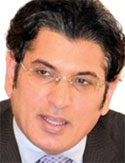‘Decisive Storm’ Contains Threat

By Mohammed Fahad Al-Harthi
27 March 2015
Decisive Storm, a name with so many meanings in the international war against Houthi militias in Yemen, is currently under way. Saudi diplomacy is known for being careful. It is known for giving opportunities for moderate solutions. The Kingdom and the Gulf countries played a role in helping Yemen and saved it from collapse thanks to the Gulf initiative, which was signed by many parties with international auspices.
The Houthi coup was a serious issue that cancelled that agreement. Unfortunately, after an initiative that rescued former President Ali Abdullah Saleh and gave him immunity, he himself allied with the Houthis and conspired with them against the legitimate government. The victims were the Yemeni citizens who are suffering economic difficulties and are being torn because of internal conflicts.
The GCC released a statement ensuring that Yemen’s security is essential for the Gulf’s security and that the GCC is committed to supporting legitimacy. Even until now, the Gulf suggested hosting a Riyadh-based conference to initiate a dialogue between the conflicting parties. However, the Iranian-backed Houthis ignored all attempts, expanded to Aden and used airstrikes to hit the presidential compound and threaten the Yemeni citizens.
Iran has intensified efforts to intervene in the internal affairs of the Arab countries and found Yemen as a strategic location and used the sectarian politics as a way to intervene in their internal affairs.
Some have misunderstood the Saudi carefulness when treating this issue. Saudi and the Gulf states noted how Iraq, an important Arab country, was heading in the same direction as Iran. Yet the Gulf countries respected their neighbours and left the internal affairs to Iraqis. At the same time, Iran was intervening and establishing its militias to play a role in the Iraqi affairs. Baghdad, once the safeguard of the eastern gate of the Arab world, was used by Iran as a path to influence Damascus and the Southern Dahyieh in Beirut.
That is why international decisiveness to confront the Houthis was needed. The war, albeit ugly, was the last resort and came in response to the request of the legitimate government. This is why there was a strong international support to this military campaign with 10 countries participating in the military operation.
The US and Europe have also supported this campaign. This was a clear message that the world is gaining conscience about Iran’s expansion in the region and that the policy of lenience gives a better chance for this expansion. ‘Decisive Storm’ was a strong message that this policy doesn’t show weakness but an attempt to avoid the difficult case scenario. The message was clear that the Gulf states are ready for a military response if necessary.
Yemen is a sister state and many Yemenis live in Saudi Arabia, with guarantees that the current events will not affect them. Saudi Arabia is Yemen’s largest supporter and there is a public and governmental appreciation in Yemen for the military intervention. Yemeni Foreign Minister Riad Yassine appreciated the rapid response by the Gulf countries to protect Yemen from the Houthi coup.
The international alliance led by Saudi Arabia is the right move. Hooliganism in the region and proxy wars have put the region in successive crises and threatened the entire regional system. Sometimes, there’s a need for a strong position that will make threatening countries realize that there are red lines that can’t be crossed.
Source: http://www.arabnews.com/columns/news/723961




 Moderate Islamist here
Moderate Islamist here


0 comments:
Post a Comment